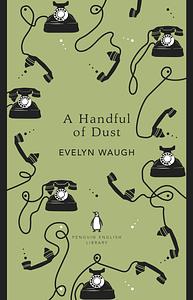Take a photo of a barcode or cover
As a satirical work based around the upper classes and their lives and homes, I really enjoyed this. I chose to read this book as part of my study into the stately home in the first half of the twentieth century, and therefore found this book a particularly helpful resource.
The sharp turn the book takes from the mundane everyday lives of the main characters into tragedy and struggle was particularly unexpected, and set quite a different tone for the second half of the book, which I did enjoy in a strange way, if only for the unexpectedness of it.
Overall I found this book to be an interesting satire of the upper classes and society at the time, the dynamics and struggles they faced, but it didn’t particularly hold me all the way through, sometimes the mundanity of their lives in the first half of the book made the experience of reading of it feel quite mundane.
The sharp turn the book takes from the mundane everyday lives of the main characters into tragedy and struggle was particularly unexpected, and set quite a different tone for the second half of the book, which I did enjoy in a strange way, if only for the unexpectedness of it.
Overall I found this book to be an interesting satire of the upper classes and society at the time, the dynamics and struggles they faced, but it didn’t particularly hold me all the way through, sometimes the mundanity of their lives in the first half of the book made the experience of reading of it feel quite mundane.
challenging
slow-paced
Plot or Character Driven:
Character
Loveable characters:
No
funny
medium-paced
Plot or Character Driven:
Character
Strong character development:
Complicated
Loveable characters:
No
Diverse cast of characters:
Complicated
Flaws of characters a main focus:
Yes
at first, i didn't like it. i thought it was boring and plotless. however, upon reading further into the novel, i began to fully enjoy myself! last's exploits in the amazon were quite entertaining, and made the book way better. 4.5 stars.
Classicly dry, vaguely depressing, more so than Brideshead.
reflective
slow-paced
Plot or Character Driven:
N/A
Strong character development:
N/A
Loveable characters:
Complicated
Diverse cast of characters:
No
Flaws of characters a main focus:
Yes
I was rather surprised by how much I enjoyed this book, because I typically struggle to read books written in this period. I can handle the language of those written between the Regency and Edwardian eras, but these 1920s - 1940s novels are typically written in a way that leaves me scratching my head in frustration.
But this? This I enjoyed.
I loved how selfish Brenda was. Okay, she'd be utterly intolerable in person, but I liked how she barely considered anyone but herself. It was fun to read. And John Beaver's inspid behaviour was such a fun match. Those to were destined to be awful for one another. Waugh's skill at having Brenda shoot herself in the foot with a simple, misplaced 'Thank God' was a stroke of mastery.
And though I don't think Tony's ending was justified (a rather extreme and miserable fate, isn't it?), he wasn't exactly perfect, either. His snapping at John Andrew was rather cruel. The poor lad did nothing wrong but cry.
But about that ending... it really came out of nowhere. Tony? Getting stuck in the Brazilian jungle? Reading Dickens for eternity? How did that relate to he rest of the novel? I understand Waugh had just converted to Catholicism before this was published, but... I truly don't understand the logic there, or the rationale.
But this? This I enjoyed.
I loved how selfish Brenda was. Okay, she'd be utterly intolerable in person, but I liked how she barely considered anyone but herself. It was fun to read. And John Beaver's inspid behaviour was such a fun match. Those to were destined to be awful for one another. Waugh's skill at having Brenda shoot herself in the foot with a simple, misplaced 'Thank God' was a stroke of mastery.
And though I don't think Tony's ending was justified (a rather extreme and miserable fate, isn't it?), he wasn't exactly perfect, either. His snapping at John Andrew was rather cruel. The poor lad did nothing wrong but cry.
But about that ending... it really came out of nowhere. Tony? Getting stuck in the Brazilian jungle? Reading Dickens for eternity? How did that relate to he rest of the novel? I understand Waugh had just converted to Catholicism before this was published, but... I truly don't understand the logic there, or the rationale.
As contemporary social commentary goes, this is top notch. I wonder how many readers were offended when this first got published. For me, though, it was like reading about the 1930s sequel to the last season of Downton Abbey. At times, I wondered if Julian Fellowes had found some inspiration for Lord Grantham in Tony Last. The depiction of London society and the lifestyle of the British upper class was politely brutal, showing but never describing the cruelty and self-serving of Brenda and the rest of the ridiculous women who prance through the story. The depiction of the 'Indians' and 'blacks' of South America is perhaps less accurate but no less unflattering, and I actually flinched and had to set aside the book at a page where Waugh casually tosses in what is now an wholly unacceptable derogatory term. Sometimes I wonder why I enjoy reading pre-War English literature so much, given how women and minority groups are so often depicted. Then I remember that my favourite English writers from that period are not men but women, and I feel a bit relieved. Yes, the particular women in this novel were pretty awful, but how many female authors wrote and published books in the 1930s about women who were treated badly by their asshole husbands but were unable to divorce so spent their inheritance on an adventure abroad? Probably none, because women's rights. But I desist.
As a reader, I generally struggle to connect with characters when they are presented but we never gain access into their inner thoughts and feelings. Perhaps this is why I am not hugely fond of reading plays. This novel was no different, in that respect. However, I cannot but admire Waugh's ability to depict English society and the strange way of well-bred savagery that was perhaps unique to the British upper class at the time. Once the story ventured away from British shores, I found it slightly more cumbersome and clumsy, almost like Dickens suddenly writing about settlers on the Oregon Trail halfway through Great Expectations. But perhaps that disjointedness was intentional, and I'm sure there are some literary critics who argue that there is some metaphorical reasoning in that plot development. It's just one of those things that the each reader must consider and come to their own conclusion about, I suppose.
As a reader, I generally struggle to connect with characters when they are presented but we never gain access into their inner thoughts and feelings. Perhaps this is why I am not hugely fond of reading plays. This novel was no different, in that respect. However, I cannot but admire Waugh's ability to depict English society and the strange way of well-bred savagery that was perhaps unique to the British upper class at the time. Once the story ventured away from British shores, I found it slightly more cumbersome and clumsy, almost like Dickens suddenly writing about settlers on the Oregon Trail halfway through Great Expectations. But perhaps that disjointedness was intentional, and I'm sure there are some literary critics who argue that there is some metaphorical reasoning in that plot development. It's just one of those things that the each reader must consider and come to their own conclusion about, I suppose.
I had to read this for a class, and it was my favorite novel we read in the course. The biting satire and the portrait of postwar British gentry life is compelling for me. It’s not for everyone, but as far as my personal taste goes, I enjoyed it.







